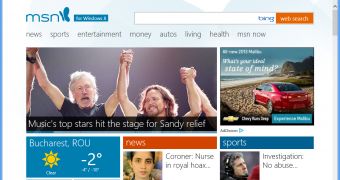Internet Explorer 10’s factory-enabled Do Not Track option is one of the most controversial features ever introduced in Microsoft’s in-house browser, especially because it is turned on by default.
And even though advertisers and several organizations across the world have criticized the Redmond-based technology giant for this option, Microsoft has absolutely no intention to go back and revert its decision, General Counsel Brad Smith told Bloomberg in an interview.
“We crossed the Rubicon and are completely comfortable being on the other side of the river,” he said. “We have no intention of going back and have no intention of engaging in discussion on that possibility.”
Microsoft previously said that Do Not Track shall remain enabled by default especially because users have asked for a feature capable of protecting their privacy while browsing the Internet.
DNT is currently available exclusively in Internet Explorer 10. This browser version is installed by default on Windows 8, Microsoft’s latest operating system, and also comes in the form of a preview build on Windows 7 platforms.
“As an industry we have not done a good job of defining what it means to respect the signal when the users asks us not to follow them around the internet. Secondly, consumers are saying the same thing – they are saying; ‘if I said to you, please respect the privacy settings that I have put in place, please make sure that it’s easy to designate. I don’t want to be followed around,’” Frank Holland, corporate vice president of Microsoft Advertising & Online, said last month.
Yahoo is one of the companies that opposed to Microsoft’s decision to turn on DNT by default and in October said that it planned to ignore this option completely on its websites.
“Recently, Microsoft unilaterally decided to turn on DNT in Internet Explorer 10 by default, rather than at users’ direction. In our view, this degrades the experience for the majority of users and makes it hard to deliver on our value proposition to them. It basically means that the DNT signal from IE10 doesn’t express user intent,” Yahoo said.
Several companies, including AT&T, McDonalds, IBM, Intel, Dell and Ford Motor Company, have already asked Microsoft to disable the option, as it blocks the websites from collecting user data from advertising purposes.
This could affect the overall ad performance, as online services won’t be able to deliver relevant ads to visitors, the companies explained in early October.

 14 DAY TRIAL //
14 DAY TRIAL //